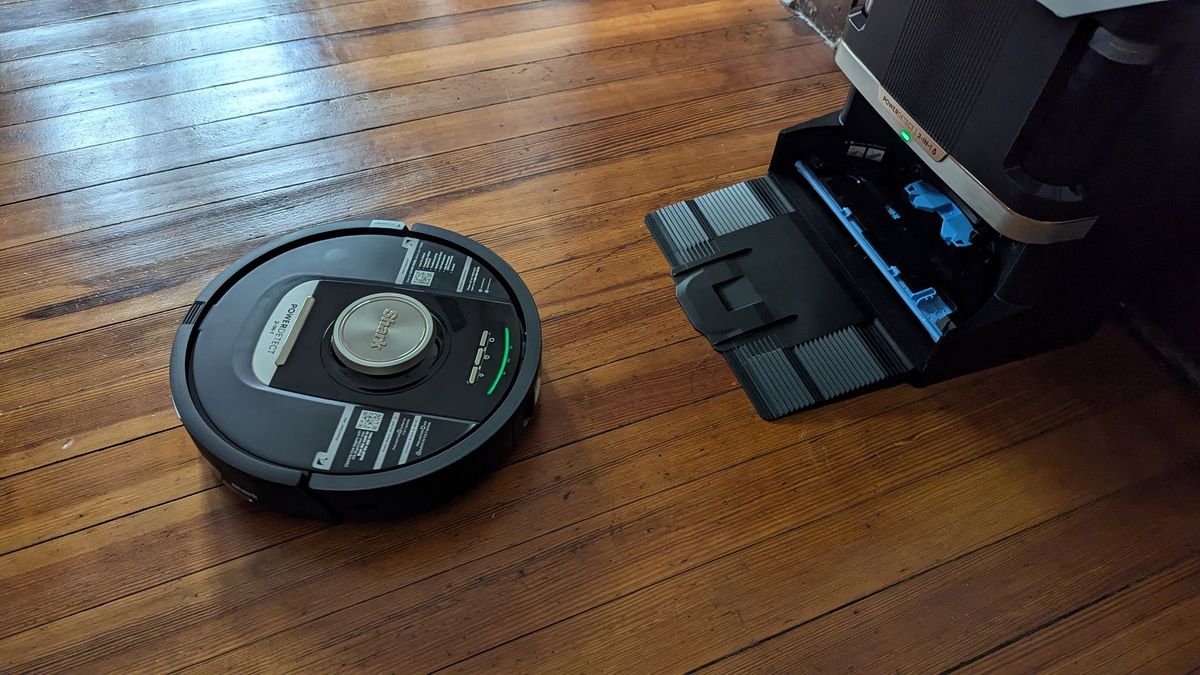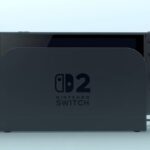Shark PowerDetect Robot Vacuum and Mop two-minute review
Product info
There are a few versions of this product.
With NeverTouch Pro base:
US: RV2820ZE
UK: RV2800ZEUK
With NeverTouch base:
US: RV2820YE
UK: RV2800YEUK
For this review, I tested the US model with the NeverTouch Pro base. There may be minor differences between different countries’ models.
The Shark PowerDetect 2-in-1 Robot Vacuum and Mop with NeverTouch Pro Base isn’t the first robot vacuum on the market that can mop and vacuum at the same time, but the fact that it’s outfitted with lots of smart technologies makes it stand out. In fact, it has wide range of detection capabilities, some of which are borrowed from today’s best Shark vacuums, including the ability to detect what kind of floor it’s on and how dirty it is, as well as being able to spot wet or dry spillages and stains, and automatically adjust its cleaning behavior to suit.
In my testing, I found the PowerDetect robot vacuum did a great job with different types of stains and debris of varying sizes, and the detection features worked as advertised. Expect the best clean when the vacuum and mop work together. Unfortunately, the suction wasn’t strong enough to completely pull up super-fine materials like flour from hard floor or a thick rug, and you’ll almost certainly need to supplement it with a manual vacuum for occasional deep cleaning – but that’s not unusual, even with the very best robot vacuums.
The mopping is effective, but left my wood floors wetter than I would have liked. Unfortunately, you cannot opt out of the automatic cleaning and instead manually choose vacuum or mopping settings, which is frustrating in situations like this.
One standout feature is this robovac’s ability to roam over high thresholds; I’ve never seen a robovac that can lift itself as high as the PowerDetect can. It also has a novel approach to edge cleaning: when it gets near an edge, the robot blasts air to move debris into the cleaning path. Unfortunately, over-sensitive object avoidance means that it doesn’t always get close enough to the edges of rooms to make this feature as effective as it could be. On the plus side, the companion app is easy to use and very accurate.
Shark launched its PowerDetect robot vacuum in summer/fall 2024. The combination robot vacuum-and-mop is available with a NeverTouch Pro base, which self-empties, cleans its own mop pads, and refills its own water tanks. That’s the priciest option and the one I tested for this review, and I appreciated how it took care of so many maintenance tasks for me. However, if you’re on a budget, you can opt for a model with a NeverTouch base (no ‘Pro’). It’s the exact same robot vacuum, but the dock doesn’t self-clean and it doesn’t have an anti-odor puck.
(Also in the PowerDetect range is an even cheaper robovac that doesn’t have mopping capabilities at all, and various manual vacuums – head to TechRadar’s Shark PowerDetect Cordless Stick Vacuum review to see how we got on with one of those.)
Read on for my full Shark PowerDetect Robot Vacuum and Mop review.
Shark PowerDetect Robot Vacuum and Mop review: price & availability
- Price with NeverTouch Pro Base: $999.99 / £799
- Price with NeverTouch Base: $899.99 / £699
- Launch date: September 2024
- Availability: US and UK
The Shark PowerDetect 2-in-1 Robot Vacuum and Mop launched in the US and UK in September 2024. It’s available to buy direct from Shark, as well as via third party retailers like Amazon.
For this review, I tested the most expensive option: the PowerDetect robot vacuum and mop with NeverTouch Pro base. This has a list price of $999.99 / £799.
Alternatively, you can pick up the same robovac but with a slightly less advanced base (the NeverTouch base – no ‘Pro’). This one doesn’t self-clean its mop pads, and there’s no anti-odor puck. This is currently available in the US for $899.99 and the UK (although, weirdly, not currently on the Shark UK website) for £699.
There’s also a basic version, which still self-empties but doesn’t mop. In the US this costs $599.99 (product code RV2820AE). It’s also available in the UK for £499.99 (RV2820VEUK).
On my review model, an extra mop pad, odor neutralizer cartridge, and multi-surface cleaning solution were included. Further replacements are available direct from Shark.
At TechRadar, a robot vacuum that costs more than $800 / £650 is considered a premium model, so the 2-in-1 PowerDetect falls into that band. Generally, self-empty robovacs, and combination vac-mops do sit at the upper end of the market, although it is possible to pick them up for as little as $350.
Overall, this robot does a great job in a lot of areas, especially in terms of mapping and ease of use. Do I think the model I tested is worth $999? I’d say a fairer price might be $799, as I’ve tested other robot vacuums with more features, such as live camera, voice control and so on.
Even though it’s very new, you might still be able to snag a discount. The Black Friday deals often deliver particularly good robot vacuum deals, and until then it’s worth keeping an eye on TechRadar’s Shark coupon codes for other ways to shave a few dollars off.
- Value for money score: 3.5 out of 5
Shark PowerDetect Robot Vacuum and Mop review: design
- Circular robovac with vacuuming and mopping abilities
- Base charges, self empties and (if Pro version chosen) self-cleans
- Robot controlled via companion app
The Shark PowerDetect 2-in-1 Robot Vacuum and Mop with NeverTouch Pro Base is a black circular robot vacuum that’s 13 inches in diameter and has a cleaning path width of 5.69 inches. At 2.7 inches tall, it can fit under most cabinets.
My review model came with the NeverTouch Pro base, which is has a dark gray – almost black – in color. It stands 17.5 inches tall, 18.8 inches wide, and 14.33 inches deep. This dock charges the robovac, cleans its mop pads, empties its onboard dust cup and dirty water, and refills the onboard water tank. It also has an anti-odor puck to prevent bad smells building up.
The Pro base is pretty compact compared to other robovac-mops I’ve tested, but if you’d prefer something smaller, take a look at the regular NeverTouch base (RV2820YE). It lacks self-cleaning capabilities and doesn’t have the anti-odor puck, and it looks a little different in that the water tank on the base is visible.
The robot itself has a side brush (an extra is included in the box) for gathering dirt and debris, as well as a half-circular mopping pad and a dust cup with a capacity of 0.33 quarts. It’s also outfitted with LED lights and has NeverStuck Technology which means the robot is designed to be able to lift itself over obstacles, thresholds, and thick carpets; I’ve never seen a robot vacuum lift itself as high as this one can.
When mopping, the robot also lifts the pad when moving over rugs. To assist with edge cleaning, the PowerDetect robovac blasts air to pushes debris from the edges of rooms and into its cleaning path. It can also extend the mopping pad up to an inch out from its sides for better edge mopping.
The base itself has a bin designed to last 60-days (no actual capacity is provided), while the water tank is capable of filling the robot with water for 30 days (again, no specifics from Shark). Thanks to felt and washable foam filters, as well as a HEPA filter, you can rest assured that the vacuum contains the dust and allergens it picks up.
Setting up the robot was fairly easy. It doesn’t take more than connecting the ramp to the base, filling the tank with water, attaching the side brush to the bottom of the robot, inserting the odor cartridge on the top of the base, and leaving everything to charge. I downloaded the app and connected the robot vacuum to my Wi-Fi. It took a few tries but not so many that I was concerned or frustrated. This is pretty typical for me during the testing of products with Wi-Fi or Bluetooth connectivity.
Although it’s far from basic, this Shark robot vacuum lacks some features I’d expect in the premium price bracket – for example, voice control (it will emit voice commands to let you know when it needs to charge or if it gets caught on something, but you can’t issue instructions back), the ability to move the robot vacuum with controls in the app, and live camera footage.
Shark PowerDetect Robot Vacuum and Mop review: performance
- Great at object avoidance and climbing thresholds
- Decent job at vacuuming and mopping
- NeverTouch Pro base takes care of most maintenance
After connecting the Shark robot vacuum to the app, it mapped my house. I was very surprised by how quickly it mapped the house and how accurate the map was. I think it’s the most accurate initial map that I’ve seen from a robot vacuum, especially considering that the robot didn’t go to every room in my house. While I’ll go more into detail about the app in the following section, I found it really easy to control the Shark robot vacuum in the app.
To begin my testing, I set the Shark robot to vacuum and mop my entire house so I could get a good sense for how it would work on a regular basis. I noticed a few things during this process. For one, the robot does a great job of object avoidance. I never saw it hit a wall or any of my furniture. This was impressive. I think the only drawback to this aspect is that it may impact the edge cleaning.
The robot seemed intent on not hitting a wall or an object, and because of that, it didn’t get as close as I would have liked it to get for superior edge cleaning. Yes, with EdgeDetect technology, the robot vacuum blasts air to move debris near the edges into the cleaning path. However, it needs to get closer to an edge to even effectively use such technology.
EdgeDetect is just one of a range of detection capabilities offered by this robovac. Another key one is ‘DirtDetect’, which essentially means the vacuum can sense how dirty a floor is and automatically adjust suction in response. However, on Shark’s manual vacuums, you also have the option to manually set a suction level, whereas there’s no manual control option here.
As someone who has a house with a lot of tall thresholds, I was curious to see how well the robot would be able to climb over them. It easily lifted itself over all my thresholds except for one, which I’ve never seen a robot able to do (it’s about two inches tall, so that’s understandable).
The base took more time than I expected to fill the robovac’s onboard water tanks. Since it’s a hands-free process, it’s not the biggest concern but something I wanted to note. I didn’t think I’d be impressed by the Shark’s robot’s mopping capabilities, because I am not a fan of the type of mop pad this robot uses. It’s a half circle pad that sticks to the bottom with Velcro. I prefer rotating circular pads as I think they clean better.
That said, I was pleasantly surprised with the Shark PowerDetect robovacs mopping abilities. This is due in part to the fact that the robot can move the mop pad from side to side offering enough friction to pull up dirt and stains from the ground. Thankfully, the robot lifted the mop pad significantly when it went over the rugs.
One of the biggest drawbacks of this robot vacuum is that it left behind too much water on my floors. Because I have historic wood floors, I have to be especially careful when it comes to mopping (water can damage wood floors). I was disappointed that I could not adjust the water level of this robot vacuum in the app.
Because the robovac is able to vacuum and mop simultaneously, it can clean your entire house in half the time it would normally take (for instance, if you had to vacuum first and the mop after). In most cases, it’s actually better to instruct the robovac to mop and vacuum at the same time, because vacuuming doesn’t always completely remove fine dust, and the mop can deal with any remnants.
Cleaning tests
To accurately gauge the Shark’s cleaning prowess I ran some standardized tests. I placed a ground coffee and flour mix on my laminate floor and the same mixture on a rug and used the spot cleaning feature of the robot to send it to both spots to see how well it vacuumed the area. I like that there is a spot cleaning option, but unfortunately, you can’t adjust the size of the spot in the app.
On the laminate flooring, the robot had a sound rating of 69dB. It picked up the coffee with ease. When it came to the flour, it did a pretty good job, though it wasn’t completely perfect. Rather, it left behind a small dusting of flour, which leads me to say that, if you drop fine materials on hard flooring, such as flour, you should probably use the vacuum and the mop function in conjunction to clean it completely.
When I sent the robot to the rug, the noise level increased to 70dB. It actually did a better job of vacuuming the rug than I thought it would. Like on hard floor, the robot picked up all of the coffee, but it left a round patch of flour. The brush also flung some of the flour out of the spot-cleaning zone, and thus it was not vacuumed.
Next, I tested the mopping capability by placing a puddle of water and some dried syrup on the floor. With a sound rating of 69dB, the robot picked up the liquids easily. I couldn’t tell if the robot pushed the water around as it leaves a good amount of water behind anyway, but it seemed to clean the syrup well. After the floor dried, I noticed a very slight (and I mean very slight) stickiness to the floor, and just to be safe, I had the robot mop the spot once again.
This Shark robot takes about 3.5 hours to fully charge and then runs for about 2 hours and 20 minutes before it needs to recharge again. If it runs low on power in the middle of a cleaning job, it just recharges enough to finish cleaning your house. The robot isn’t able to clean my 1,600-square-foot home completely on a single charge. This is not really a concern for me since the robot vacuum takes itself to the base, recharges, and then finishes the cleaning job when it’s ready. I don’t have to do anything but sit back and let it clean on its own time.
My favorite aspect of this Shark vacuum is the hands-free cleaning. The NeverTouch Pro base lived up to its name. It not only pulls the dirt and debris from the vacuum and stores it in a sealed 60-day capacity bin, but it washes and dries the mopping pad after every clean. I should also add that the water tank holds 30 days’ worth of water, which is impressive considering how small the base appears from the outside.
Maintenance
As for other elements of maintenance, the vacuum and base need to be cleaned about every 30 days. You’ll have to use a dry dust rag to clean the sensors and charging contacts on the robot and in the base. The base can be cleaned with a wet rag and then dried with a cloth. The brushroll and side brush need to be cleared of hair, string, or debris. The mop pad should be washed and/or replaced every three months. The base’s dustbin should be emptied once a month.
The filter in the robot and the filter at the top of the base should be cleaned once a month, by shaking them free of dust and debris over a trashcan and then rinsing the foam filters with cold water and allowing them to air dry for 48 hours. On the bottom side of the base there is another filter, the post-motor filter, that can be cleaned every 6 months. You’ll also want to clean the water container with soap and water before refilling it.
- Performance score: 4 out of 5
Shark PowerDetect Robot Vacuum and Mop review: app
- Easy-to-use app with great mapping and instructional tips
- Whole house clean, room clean, or spot clean options
- App contains schedule and cleaning history
I love a simple and easy-to-use app, and the Shark app is just that. The map that was created of my house is quite accurate. Take note that it’s only 2D; there are no 3D mapping options. The map shows the different rooms in my house and even has some shadow areas that indicate furniture or things like a bathtub.
I can easily adjust the map – which I did by merging two rooms together that the robot separated and then splitting two rooms that the robot determined as one. I can also label my rooms and create no-go zones. Unfortunately, you can’t customize a no-go zone. For instance, I would like to create a no-go mopping zone for a specific area of my house, but the app doesn’t allow that.
The app is where you can see the battery life and instruct the robot to return to the dock, pause, or set it to vacuum, mop, or vacuum and mop at the same time. I can choose to have the Shark robot clean the entire house, one room, or to spot clean in a certain area. Unfortunately, with the spot clean feature, I can’t adjust the spot cleaning box to be smaller or larger. It seems to be a set size that I have to move on the map to the area I want cleaned.
Not only can I schedule the robot to clean and look at the cleaning history, but there is a support section that answers all of my questions related to the use and care of the robot vacuum. I also like the little notifications found on the main page as they can be helpful in knowing if there was an issue while cleaning or if the robot used some particular function to improve the cleaning experience.
This app would benefit with a few additions, such as the ability to adjust the water flow and vacuum suction power. As it is, the vacuum adjusts the suction and mopping functions based on its ability to detect dirt on the ground. While this is impressive, it would be nice to have some more control in some situations.
Shark PowerDetect Robot Vacuum and Mop specs
| Wattage: | 650W |
| Robot diameter: | 13″ |
| Robot height: | 2.7″ |
| Cleaning path width: | 5.69″ |
| NeverTouch Pro dock dimensions (H x W x D): | 17.5 x 18.8 x 14.33″ |
| Dock cord: | 6ft |
| Weight (robot + dock): | 25lbs |
Should you buy the Shark PowerDetect Robot Vacuum and Mop?
| Attribute | Notes | Score |
| Value for money | A premium robot vacuum, and slightly overpriced – lacks some advanced features I’d expect at this price. | 3.5/5 |
| Design | The circular robot vacuum can mop and vacuum at the same time and even cross tall thresholds. It charges and empties dirty water and dirt and debris into the compact base that doubles as a charger. | 4/5 |
| Performance | When it detects dirt and debris, the robot adjusts the suction and mopping capability for a better clean. While it avoids obstacles well, it might not get close enough to edges for the best clean and the suction is not strong enough to completely pull super fine materials like flour. | 4/5 |
| App | The easy-to-use app allows users to schedule cleanings, spot clean, create no-go zones, and more. It could be approved upon with more customization settings in terms of no-go zones, spot cleaning, and water flow. | 4/5 |
Buy it if…
Don’t buy it if…
How I tested the Shark PowerDetect Robot Vacuum and Mop
I tested the Shark PowerDetect 2-in-1 Robot Vacuum and Mop with NeverTouch Pro Base for over a week in my historic home. My house is outfitted with laminate and historic wood flooring, and some large thick rugs. To adequately rate and review the vacuuming and mopping capabilities of this robot, I ran the robot vacuum throughout my home and used various features like spot cleaning. I also conducted controlled tests where I had the robot vacuum flour and coffee from hard floors and rugs, as well as mop flour, water, and sticky materials from the laminate floor.
Read more about how we test
First reviewed September 2024
Read the full article here














